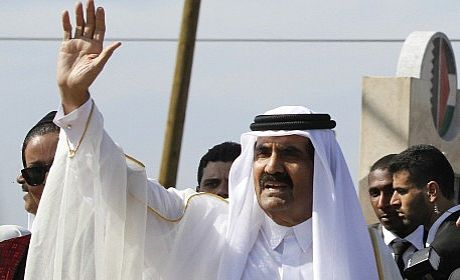There Will Be No Change in Qatar’s Foreign Policy

Today (Tuesday), Hamad bin Khalifa al Thani officially stepped down from power in Qatar’s political scene and handed power over to his son, Tamim bin Hamad al Thani. To what extent could this development have been predicted?
There has been speculation about the Emir stepping down for a few months now. But, despite persistent rumors that the Emir would step down, the power transition comes as a bit of a surprise because of Qatar's deep and multiple involvements across the Middle East, especially in places like Libya and Syria. For the last 2 to 3 years, there has been speculation about the Emir's health, and about his physical well-being. But for him to give up power at this particular point is somewhat unexpected and surprising.
Some news sources have talked about US pressure on the Qatari Emir to step down from power. What are the reasons, in your opinion, behind his resignation? Has it only been an issue of domestic affairs or has US pressure influenced this decision?
The reasons for the transfer of power appear purely domestic and are not a result of any foreign policy calculations or international pressures. There are two primary factors at work: first, the Emir's health forms the larger background and context within which Qatari politics takes place. Second, for some time now, the Emir has actually been saying that he is preparing the way for his son to rule. He first mentioned this some 3 years ago in an interview. I think one of the things the emir wants to do is to set an example both domestically and regionally, that sitting emirs and kings and sultans can and should give up power peacefully and make room for a new generation of political elites to come to the fore.
Have the recent developments in the Arab world and the formation of Arab revolutions in other Arab countries been effective in this decision?
The only influence that regional developments would have had is in delaying this decision. I actually thought that the emir would give up power about a year and a half ago, before Qatar became involved in civil wars in Libya and Syria. I think regional developments, and Qatar's involvement in them, only delayed a decision he appears to have made months ago.
How would you assess Qatar’s future when Tamim comes to power? Will he follow his father’s policies, especially on the issue of foreign policy?
No doubt, the new emir will bring with him a new style of personal rule, a new team of close advisors and allies, and a new flavor. This is, after all, a political system in which personalities are very important in shaping the nature and the overall direction and profile of the political system. However, I do not anticipate that the substance of Qatari politics, both domestically and in foreign policy, would change. Before he succeeded his father, the new emir was in charge of implementing the national vision, called Qatar 2030, in which the direction of the country's political, social, and economic developments were outlined, and Qatari foreign policy is too deeply institutionalized and embedded in regional affairs to the new emir to be able to easily disentangle the country from its foreign policy obligations (like its close relations with the US, its role as an intermediary between the US and Taliban, its support for the Syrian opposition, and the like). So I do not think we will see any major changes in Qatari foreign policy in the near future.

